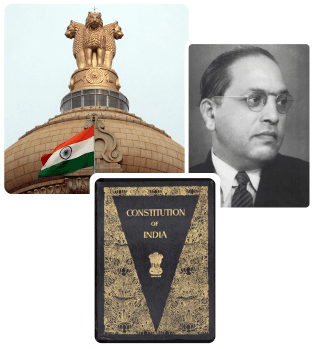Introduction
Constitution of India
The constitution is the supreme law of India. This is a written document which lays down the framework demarcating fundamental basic code, structure, procedures, powers, and duties of Government and its organizations and rights & duties of the citizen. It was adopted by the Constituent Assembly on 26th November 1949 and came into force on 26th January 1950. At the time of its adoption, the Constitution contained 395 Articles and 8 Schedules and was about 145,000 words long, making it the longest national Constitution to ever be adopted. Every Article in the Constitution was debated by the members of the Constituent Assembly, who sat for 11 sessions and 167 days to frame the Constitution, over a period of 2 year...
Read More
The Parliament
The Constitution of India, republican in character and federal in structure, embodies the salient features of the parliamentary system. It provides for a Parliament for the Union consisting of the President and the two Houses, namely, the Rajya Sabha (Council of States) and the Lok Sabha (House of the People); a Union Executive, drawn from both the Houses of Parliament and collectively responsible to the Lok Sabha. Ensuring thereby an intimate relationship between the Union Executive and Parliament; a head of the State called the President of India, acting on the aid and advice of the Union Council of Ministers; a number of States with basic provisions, parallel to those for the Union in respect of the Executiv...
Read More
Opening of Parliament by the President
Opening of parliament by the president is as per the Article 87(1) of the Constitution of India which reads as under: "At the commencement of the first session after each general election to the House of the people and at the commencement of the first session of each year the President shall address both Houses of parliament assembled together and inform Parliament of the causes of its summons,"...
View PDFQuestion Hour in Lok Sabha
Generally, the first hour of a sitting of Lok Sabha i.e. from 1100 hr to 1200 is devoted to the Questions and this hour is called the Question Hour. It has a special significance in the proceedings of the Parliament. Asking of questions is an inherent and unfettered parliamentary right of members. It is during the Question Hour that the members can ask questions on every aspect of administration and Governmental activity. Government policies in national as well as international spheres come into sharp focus as the members try to elicit pertinent information during the Question Hour. The Government is, as it were, put on its trial during the Question Hour and every Minister whose turn it is to answer questions h...
Read More
Budget in Parliament
Ours is a parliamentary system of Government based on the Westminster model. The Constitution has, therefore, vested the power over the purse in the hands of chosen representatives of the people, thus sanctifying the principle ‘no taxation without representation’. Preparation of Budget for the approval of the Legislature is a constitutional obligation of the Government, both at the Centre and the State levels. Legislative prerogative over taxation, legislative control over expenditure and executive initiative in financial matters are some of the fundamental principles of the system of parliamentary financial control. There are specific provisions in the Constitution of India incorporating these tenets. For exam...
Read More